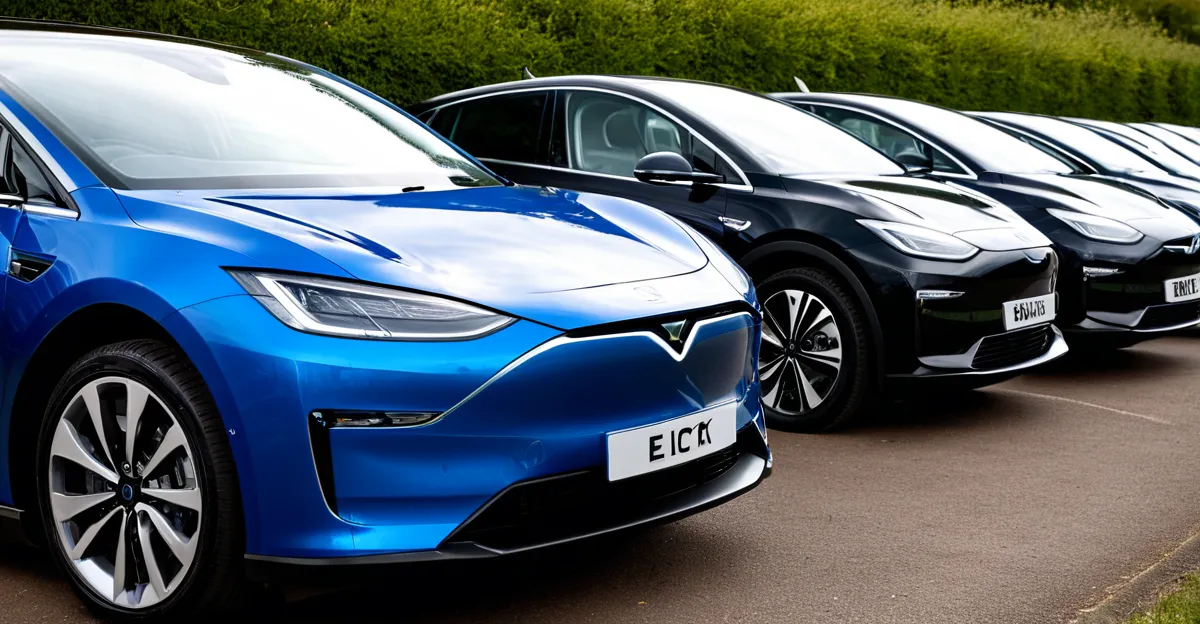Current Trends and Growth of Electric Vehicle Sales in the UK
Recent UK EV sales growth clearly shows a strong upward trajectory, with electric vehicles gaining momentum faster than many anticipated. The electric car market trends reveal that EVs now command a noticeably larger share of new car sales compared to just a few years ago, reflecting rising consumer confidence and infrastructure improvements.
Specifically, EV adoption statistics indicate that sales volumes have increased significantly quarter over quarter, with some months reaching double-digit percentage growth. This surge is partly due to the decline in internal combustion engine (ICE) vehicle sales, which continue to lose ground as the UK moves toward zero-emission goals.
Also to see : What Are the Latest UK Automotive Industry Trends?
The market share comparison between EVs and traditional petrol and diesel models shows electric cars accounting for an increasingly substantial proportion of new registrations. This shift is driven not just by environmental concerns but also by improved battery range, expanding charging networks, and government incentives.
Key drivers behind this trend include declining battery costs, government policies favoring cleaner transport, and growing consumer awareness. Together, these factors create a fertile environment for continued UK EV sales growth.
Also read : Innovative Solutions in UK Automotive Sector: What’s Next?
Impact on Traditional UK Auto Manufacturers
The rise in UK EV sales growth is compelling traditional car manufacturers to radically transform their production strategies. Many legacy brands, long centred on petrol and diesel engines, now face pressure to accelerate the industry transformation to stay relevant. This shift is evident in the increased allocation of resources towards electric vehicle platforms, signaling a clear manufacturing adaptation.
Phasing out petrol and diesel models has become a priority as regulatory targets tighten and consumer demand shifts. Established automakers are balancing manufacturing legacy vehicle lines with investments in EV technology. This dual approach often involves retooling factories, re-skilling employees, and forming partnerships focused on battery innovation and component supply.
To navigate the EV transition successfully, traditional car manufacturers are adopting several strategic measures:
- Diversifying product ranges to include hybrid and fully electric vehicles
- Enhancing R&D efforts for battery and drivetrain improvements
- Collaborating with tech companies to accelerate electrification
These strategies aim to maintain market position while embracing renewable vehicle trends, highlighting an ongoing but challenging transformation within the UK’s automotive manufacturing sector driven largely by the accelerating UK EV sales growth.
Influence on Employment and Skills Within the Auto Industry
Electric vehicle adoption is driving significant change in the automotive job market. As traditional manufacturing adapts, some roles tied to petrol and diesel engine production are diminishing. However, this shift creates new employment opportunities in EV-specific areas such as battery assembly, electric drivetrain manufacturing, and software development.
In response, EV skills training has become vital. Workers require upskilling in advanced electronics, battery technology, and vehicle software systems. To address this need, many companies and training institutions are offering specialized programs to facilitate the workforce transformation.
Regionally, automotive employment impacts vary. Areas historically dependent on ICE manufacturing face challenges in job retention, while regions investing in EV facilities benefit from job creation. Sectorally, there is a growing demand for engineers, technicians, and software developers knowledgeable in EV technologies.
This transition’s complexity demands coordinated efforts between industry, government, and education to ensure a skilled, adaptable workforce capable of supporting ongoing automotive job market changes shaped by the UK’s accelerating EV adoption statistics.
Changes in the Automotive Supply Chain
The EV supply chain is undergoing a significant manufacturing adaptation to meet rising demand from UK EV sales growth. Traditional part suppliers are shifting focus from internal combustion engine components to electric drivetrains, battery packs, and power electronics. This transition challenges legacy suppliers to innovate rapidly or risk obsolescence.
Battery production UK stands as a cornerstone for securing the local supply of key EV components. Several initiatives aim to develop gigafactories domestically, reducing reliance on international sources. This localization improves supply chain resilience and supports the growth of EV manufacturing in the UK.
Component sourcing now balances domestic capabilities with global imports, emphasizing strategic partnerships. While domestic supply offers shorter lead times and aligns with industry transformation goals, certain battery materials remain dependent on international markets, posing vulnerabilities.
Opportunities arise for UK suppliers capable of innovating in battery chemistry, cell manufacturing, and recycling. Overcoming logistical and technological hurdles will be critical to fully realizing benefits from the expanding EV market and sustaining the ongoing UK EV sales growth trajectory.
Government Policy and Regulatory Landscape
Government policies are pivotal in shaping the pace of UK EV sales growth. The UK government has implemented robust EV policies supporting zero emission targets aimed at phasing out petrol and diesel vehicles by 2030. These incentives and regulations include financial subsidies for buyers of electric cars and stricter emissions standards, directly influencing consumer choices and accelerating the market shift.
The 2030 petrol and diesel sales ban incentivizes manufacturers to accelerate their industry transformation strategies, fostering greater investment in electric vehicle technology. Public investment is also channeled into expanding EV infrastructure and research and development (R&D), further supporting mass adoption.
Such policies create a favorable environment where manufacturers, suppliers, and consumers align towards cleaner mobility. Notably, the synergy between government incentives and regulations and UK EV sales growth drives innovation and market expansion. Continuous policy refinement is essential to address evolving challenges like charging infrastructure gaps and battery supply constraints, ensuring that regulatory frameworks sustain momentum towards the UK’s ambitious zero emission targets.
Infrastructure Development and Market Readiness
The rapid UK EV sales growth demands significant expansion of the EV charging infrastructure UK. As electric vehicles become more prevalent, accessible and reliable charging stations are essential to sustain consumer confidence and support daily use. Current efforts focus on increasing the number and variety of chargers, from rapid public units to residential and workplace installations.
Grid capacity is another important factor. Increased electricity demand from widespread EV adoption requires upgrades to local and national grids. This ensures stable power supply and prevents bottlenecks caused by peak charging times. Investments in smart grid technologies and energy storage integration are being pursued to enhance flexibility and efficiency.
Barriers remain, including inconsistent regional coverage and high installation costs. However, coordinated public and private sector initiatives are addressing these challenges to improve market readiness. Enhanced infrastructure aligns closely with accelerating EV adoption statistics, helping to remove one of the key hurdles to mass electric vehicle uptake across the UK.
Opportunities and Challenges for Stakeholders
The accelerating UK EV sales growth presents vast industry opportunities alongside notable EV challenges for manufacturers and dealers. Startups and new entrants benefit from a landscape that rewards innovation in electric drivetrains, battery technologies, and connected vehicle software. This fosters a dynamic ecosystem eager to diversify traditional automotive offerings.
However, the market adaptation requires overcoming hurdles such as rapidly evolving technology, supply chain constraints, and shifting consumer expectations. Legacy manufacturers face pressure to modernize production lines and dealer networks while managing legacy ICE inventory.
Dealerships must enhance staff training to effectively sell and service electric cars, addressing consumer concerns about range, charging, and maintenance. Market education is also essential to build confidence and broaden adoption.
The balance between seizing growth prospects and solving operational complexities defines this period of transition. Strategic partnerships, investment in R&D, and agility in business models stand out as critical success factors. Ultimately, stakeholders who navigate the evolving landscape thoughtfully will capitalize on the expanding UK electric vehicle market, propelled by sustained UK EV sales growth and shifting electric car market trends.
Expert Forecasts and the Future Outlook for the UK Auto Industry
Industry experts project sustained UK EV sales growth driven by evolving electric car market trends and expanding consumer acceptance. Market forecasts anticipate electric vehicles surpassing internal combustion engine (ICE) cars as the dominant new car segment within the next decade. Analysts highlight that ongoing EV adoption statistics signal not just a passing trend but a structural change fueled by technology advancements and regulatory pressure.
Predictions emphasize that the UK auto industry must continue its industry transformation to remain globally competitive. This includes further manufacturing adaptation toward battery production and electric drivetrains. Experts also foresee growing demand for skilled workers versed in EV technologies, reinforcing the need for accelerated EV skills training and workforce development.
Several scenarios outline risks such as supply chain disruptions or slower infrastructure growth, which could temper the pace of UK EV sales growth. However, optimism prevails due to government support and private investment in research and development. The amalgamation of these factors creates a robust outlook where electrification defines the future landscape of the UK auto industry.




